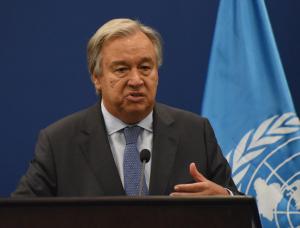June 28 (UPI) — Control over oil production in Libya and the revenues they generate needs to be in the appropriate hands, the U.N. Security Council said Thursday.
Libya’s National Oil Corp. rejected a move this week by the Libyan National Army to move on exports from the Gulf of Sirte. The move followed militant raids on oil storage depots in the east of the country that sidelined production from the member of the Organization of Petroleum Exporting Countries.
Stephane Dujarric, a spokesman for U.N. Secretary General António Guterres, said the world body stands ready to support Libya’s legitimate institutions.
“The secretary-general is concerned about the latest developments in Libya’s Oil Crescent region, he said in a statement. “He calls for de-escalation and for the return of all natural resources, their production and their revenues to the control of the recognized Libyan authorities.”
Storage tanks at the Ras Lanuf oil port suffered catastrophic damage after militants stormed the facility earlier this month. Reconstruction efforts could take several years, especially considering the tense security situation in the country.
Secondary sources reporting to OPEC said Libya produced an average of 955,000 barrels per day. Conflict sidelined about a quarter of that output so far.
A joint statement from the British, French, Italian and U.S. governments on Wednesday relayed deep concern about the security situation at Libyan oil fields and called for authority to remain in the hands of Libya’s National Oil Corp., in accordance with U.N. Security Council resolutions.
“Any attempts to circumvent the UN Security Council’s Libya sanctions regime will cause deep harm to Libya’s economy, exacerbate its humanitarian crisis, and undermine its broader stability,” the statement read.
Recent violence in Libya has supported the latest rally in crude oil prices. The price for Brent crude oil, the global benchmark for the price of oil, is up about 6 percent from Friday.
OPEC members last week agreed to ease back on a deal meant to erase a surplus on the five-year average in global crude oil inventories through coordinated production cuts. Starting in July, more oil will show up on the market to offset declines from Venezuela and Libya, and future shortages from Iran.
The U.S. State Department this week called for Iranian oil customers to cut imports to zero by early November, when sanctions snap back into place. Turkish Ministry of the Economy Nihat Zeybekci said Thursday that Ankara is bound only to U.N. sanctions, not unilateral moves by the United States.
“The decisions taken by the United States on this issue are not binding for us,” he was quoted by Turkish news agency Hurriyet as saying. “Other than this, we will only follow our own national interests. In addition, we will pay attention so our friend Iran will not face any unfair actions.”

COMMENTS
Please let us know if you're having issues with commenting.